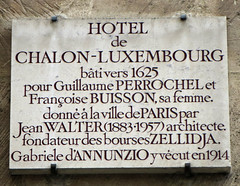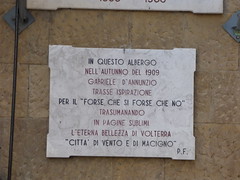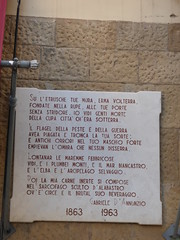Gabriele D'Annunzio
(1863-1938)
playwright and writer
Died aged c. 75
Wikidata WikipediaGeneral Gabriele D'Annunzio, Prince of Montenevoso OMS CMG MVM (UK: /dæˈnʊntsioʊ/, US: /dɑːˈnuːn-/, Italian: [ɡabriˈɛːle danˈnuntsjo]; 12 March 1863 – 1 March 1938), sometimes written d'Annunzio, was an Italian poet, playwright, orator, journalist, aristocrat, and Royal Italian Army officer during World War I. He occupied a prominent place in Italian literature from 1889 to 1910 and later political life from 1914 to 1924. He was often referred to under the epithets Il Vate ("the Poet"), or Il Profeta ("the Prophet"). D'Annunzio was associated with the Decadent movement in his literary works, which interplayed closely with French symbolism and British aestheticism. Such works represented a turn against the naturalism of the preceding romantics and was both sensuous and mystical. He came under the influence of Friedrich Nietzsche which would find outlets in his literary and later political contributions. His affairs with several women, including Eleonora Duse and Luisa Casati, received public attention. During the First World War, perception of D'Annunzio in Italy transformed from literary figure into a national war hero. He was associated with the elite Arditi storm troops of the Italian Army and took part in actions such as the Flight over Vienna. As part of an Italian nationalist reaction against the Paris Peace Conference of 1919, he set up the short-lived Italian Regency of Carnaro in Fiume with himself as Duce. The Charter of Carnaro made music the fundamental principle of the state, which was corporatist in nature. Though D'Annunzio preached Italian ultranationalism and never called himself a fascist, he has been accused of partially inventing Italian fascism, as both his ideas and aesthetics were an influence upon Benito Mussolini.
DbPedia
Commemorated on 3 plaques
Hotel de Chalon-Luxembourg bâti vers 1625 pour Guillaume Perrochel et Françcoise Buisson, sa femme. Donné à la ville de Paris par Jean Walter (1883-1957) architecte. Fondateur des bourses Zellidja. Gabriele d'Annunzio y vécut en 1914.
English translation: Hotel de Chalon-Luxembourg built around 1625 for Guillaume Perrochel and Françcoise Buisson, his wife. Given to the city of Paris by Jean Walter (1883-1957) architect. Founder of the Zellidja Scholarships. Gabriele d'Annunzio lived there in 1914. [AWS Translate]
26 rue Geoffroy-l'Asnier, Paris, France where they lived (1914)
In questo Albergo nell autunno del 1909 Gabriele d'Annunzio Trasse Ispirazione Per il "Forse, che si forse che no" Trasumanando in pagine sublimi L'eterna Bellezza di Volterra "Citta di Vento e di Macigno" P.F.
English translation: In this hotel in the autumn of 1909 Gabriele d'Annunzio he drew inspiration for the “Perhaps, that you may not” Transhumanizing into sublime pages the eternal beauty of Volterra “City of Wind and Macigno” P.F. [AWS Translate]
Albergo Nazionale - Via dei Marchesi, Volterra, Italy where they stayed (1909)
Su l'etrusche tue mura, Erma Volterra, Fondate nella rupe, alle tue porte senza stridore, io vidi genti morte della cupe Citta ch'ra Sotterra. Il flagel della peste e della guerraavea piagata e tronca la tua sorte; e antichi orrori nel tuo maschio forte empievan l'ombra che nessun disserra. Lontanar le meremme febbricose vidi, e I plumbei Monti, e il mar biancastro. E lElba e l'Arcpelago selvagio. Poi la mia carne inerte si compose nel sarcofago sculto d'Alabastro ov'e'circe e il brutal suo beveraggio. Gabriele D'Annunzio 1863 1963
English translation: On the Etruscan walls of yours, Erma Volterra, Founded in the cliff, at your door without grinding, I saw dead people of the gloomy city of Sotterra. The flagel of the plague and the waravea wounds and truncates your fate; and ancient horrors in your strong male empievan the shadow that no one dissects. Far feverish meremars I saw, and I plumbei Monti, and the whitish sea. And the Elba and the wild Arcpelago. Then my inert flesh was composed in the sarcophagus of Alabaster where he grows and brutal his drink. Gabriele D'Annunzio 1863 1963
Albergo Nazionale - Via dei Marchesi, Volterra, Italy where they commemorated on the centenary of his birth (1963)


